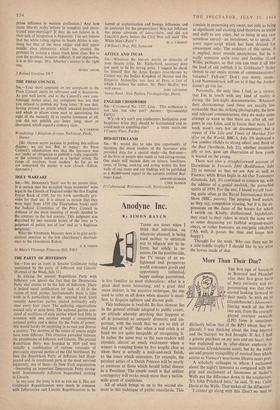Anodyne Inc.
By SIMON RAVEN
THERE are times when I think that television, on whatever channel, is being used neither to entertain nor to educate nor to in- form, but solely to re- assure. On the positive side, the TV image of an en- lightened and prosperous world, consumer goods and opportunity unlimited, happy endings guaranteed, is too familiar to need elaboration : what is a great deal more interesting, and a great deal more sinister, is the negative technique, the one used to calm us all down when disaster is mani- fest, to disguise ugliness and disown guilt.
This technique is twofold. Its first element lies in the general attitude adopted to public events, an attitude whereby anything that happens at all is presented as uniquely dramatic and im- portant, with the result that we are so sick of dud cries of 'wolf' that when a real crisis is at hand we are quite incapable of recognising it. In rather the same way as the race-readers will simulate almost as much excitement when a winner is romping home by five lengths clear as when there is actually a neck-and-neck finish, so the tones which announce, for example, the petulant antics of a Dutch Princess will be nearly as ominous as those which herald lethal disease in a President. The simple result is that neither contingency will evoke much more than a nation- wide grunt of scepticism.
All of which brings us on to the second ele- ment in this technique of public anaesthesia. This consists in presenting any event, not only as being as significant and exciting (and therefore as trivial
and dull) as any other, but as being in any case
somehow unreal—an instalment, so to speak, of some super-script which has been devised for amusement only. The architect of this series, it is implied, must remain anonymous, but he is really someone quite cosy and familiar (Lord Willis, perhaps), so that you can treat it all like the load of old rubbish it is. Goldwater? Strike threats to our entire system of communications? Sukarno? Fall-out? Don't you worry, mum : Lord Normanbrook will see to it that the Author doesn't go too far.
Personally, the only time I feel, as a viewer, that I'm in touch with any kind of reality is during the late-night documentaries. Whatever
their shortcomings (and these are usually less noticeable than the striking photography, the terse and relevant commentaries), they do make some attempt to warn us that there are, after all, ser- pents in our Eden, and to locate their nests. Last week wasn't very hot on documentary; but a repeat of The Life and Times of Marshal Tito (Eye on the World, BBC-1, July 19) deployed a few sombre clichés to strong effect, and Birth of the Beat (Southern, July 21), whether intention- ally or not, gave apt illustration of how youth is wasted on the young.
There was also a straightforward account of Darwinism in Towards 2000 (Rediffusion, July 23) to remind us that we are Ape as well as Essence; while Brian Inglis in All Our Yesterdays (Granada, July 20) continued to conjure up, with the address of a genial warlock, the perturbed spirits of 1939. For the rest, I found myself look- ing quite often at the Royal International Horse Show (BBC, passim). The jumping itself makes, as they say, compulsive viewing, but it is the ex- pressions on the faces of the horses for which I switch on. Kindly, disillusioned, lugubrious, they react to their riders in much the same way as some despairing yet faithful sergeant-major obeys, or rather humours, an energetic subaltern ('Ah well, it • passes the time and keeps him happy').
Thought for the week. Why can there not be a side-saddle trophy? I should like to see what the horses made of that.






























 Previous page
Previous page